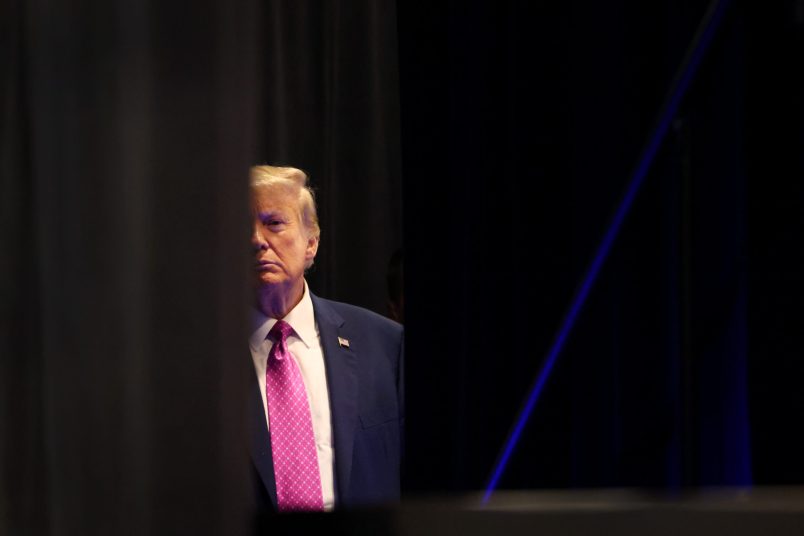A Michigan judge on Thursday heard arguments from groups seeking to knock Donald Trump off the ballot, the only swing state in which a serious Disqualification Clause case against the former President has been filed.
Michigan Court of Claims Judge James Robert Redford appeared skeptical of arguments that the Constitution’s Disqualification Clause bars Trump from appearing on the ballot, though he was careful to grill both sides on their arguments.
The court had been scheduled to hear three separate lawsuits about the issue: two from plaintiffs seeking to disqualify Trump, and a countersuit filed by the former president seeking to ensure that he would remain on the ballot.
But Judge Redford shut down Trump’s countersuit after it emerged that his attorneys had committed a procedural error by failing to include a verification page in their complaint.
That left arguments on a suit brought by serial Michigan litigant Robert Davis and Free Speech for People, a good government group which has brought suits in Michigan and Minnesota seeking to disqualify Trump.
Judge Redford referenced a Thursday decision from the Minnesota Supreme Court punting the Disqualification Clause case there until the general election.
Free Speech for People attorney Mark Brewer replied that they were starting “from the premise that Michigan law vastly differs from that of Minnesota,” and added later that the state should not “dragoon” private political parties into having ineligible candidates run in party primaries.
But Judge Redford expressed the most interest in what could end up being another way to punt the issue: whether the Section Three Disqualification Clause bars candidates seeking office, not just those already elected.
Judge Redford asked, “Your position, if correct, doesn’t it make a dead letter the last sentence of Section Three of the 13th Amendment?” That provision allows Congress to remove the disqualification by a two/thirds vote.
He added, “Let’s assume somebody does it,” referring to the momentous decision to disqualify Trump. Wouldn’t that, he asked, deprive Congress of the ability to remove the disqualification?
“Do you know of any case since the adoption of the amendment that a person seeking to become a candidate for office, as opposed to someone who had already stood and was seeking to serve, who has sought that two/thirds relief?” Redford asked.
Brewer, the plaintiff’s attorney, replied that the question was “speculative” because Trump had yet to ask for that amnesty.
Later on, during questioning of Trump’s attorneys, Judge Redford raised a similar issue. Redford said that he had read earlier drafts of the 14th Amendment in which members of Congress had initially separated a ban on running from office from a ban on holding office.
“That was a conscious choice,” the Trump attorney replied.
Brewer emphasized that the Disqualification Clause “only allows amnesty” from Congress, meaning that lawmakers’ ability to act is limited. That goes to a key debate which has come up in the Disqualification Clause cases: whether Congress needs to act in order to disqualify Trump under the 14th Amendment.
Judge Redford pressed Brewer on the question, prodding him to say whether he believed the 14th Amendment only barred insurrectionists from serving, and not from candidacy.
“That would require, what, the country to rerun an entire presidential election?” Brewer replied at one point, saying that it would be “chaos” unless the Supreme Court ruled on the issue.







Time to put the DQ nonsense to bed…
What we need is for a too-young candidate to try to sign up to run and see what happens…
I don’t always wear a necktie that’s a foot wide, but when I do, I get a yuge insurrection.
Believe me, there’s no problem there.
Or perhaps a candidate whose status as a native-born citizen was somewhat questionable? Same result: Punt.
https://www.nytimes.com/2008/07/11/us/politics/11mccain.html
Archived: A Citizen, but ‘Natural Born’? McCain’s Eligibility to Be President Is Disputed by Professor - The New York Times
More bogus arguments for Trump and willful blindness from judges not wanting to do the work. (Txlawyer is right about that.)
So. by extension, if someone is impeached and removed from office, and ineligible based on that, that person can still run, get placed on a ballot, and get votes that won’t count? Another absurd result where lawyers and judges toe themselves in knots trying to act smarter than the rest of us. (They are not.)
Clearly, the constitution does not intend to allow people to appear on the ballot if they are not eligible to hold the office thing could be elected to.